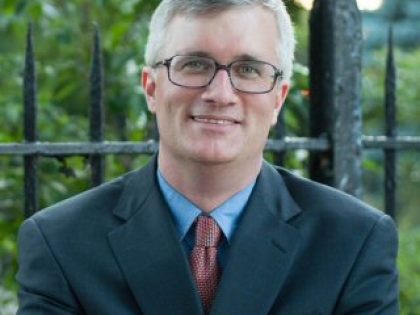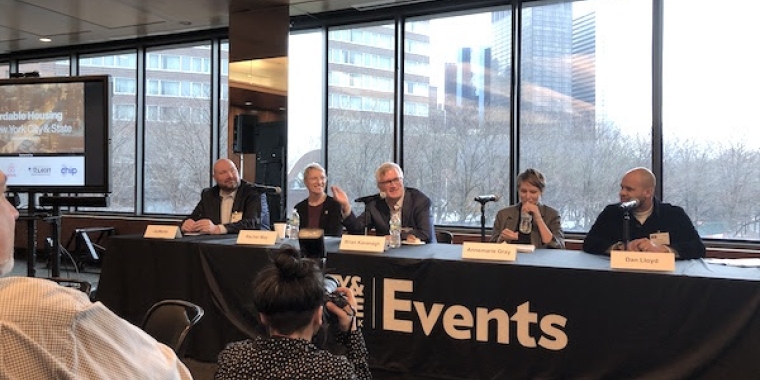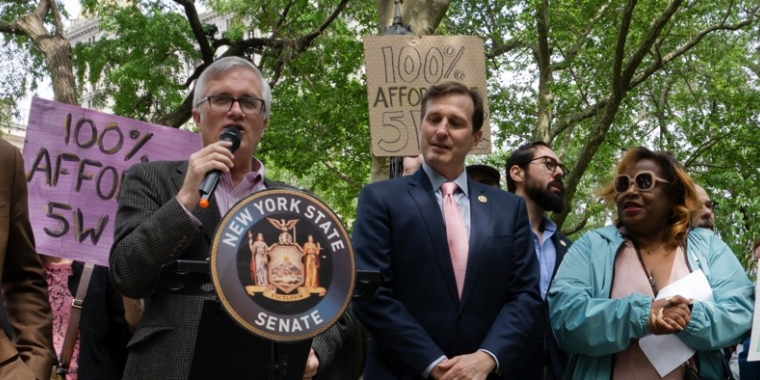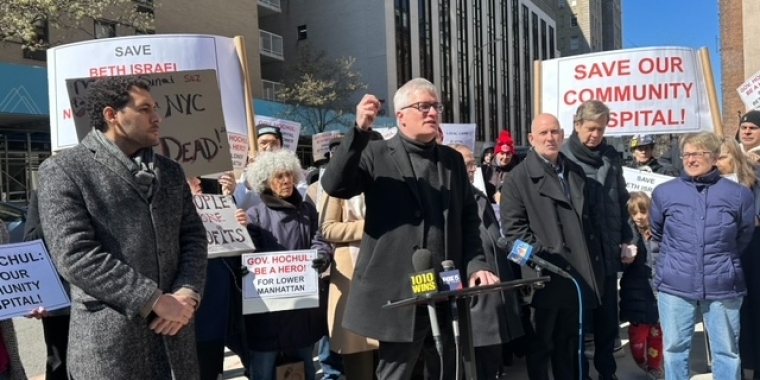
Another Half Century

Above, State Senator Brian Kavanagh, sponsor of the legislation signed yesterday by Governor Hochul, speaks at an affordable housing discussion in Battery Park City earlier this month.
Governor Kathy Hochul on Thursday signed legislation sponsored by State Senator Brian Kavanagh that will expand housing affordability benefits in Battery Park City, while also paving the way to extend the ground lease that governs property ownership within the community.
The bill aims to protect affordability for both rental tenants and condominium owners by extending a range of benefits long available elsewhere in the five boroughs, but from which Battery Park City residents have been excluded, because of the technicality that the community is governed by a State agency, rather than the municipal government. For renters, these include the Senior Citizen Rent Increase Exemption program (SCRIE) and the Disabled Rent Increase Exemption program (DRIE). Condominium owners may be eligible for the Senior Citizen Homeowners’ Exemption program (SCHE) and the Disabled Homeowners’ Exemption program (DHE).
Under the SCRIE and SCHE programs, renters who are over 62 years of age and have annual incomes of less than $50,000 can seek to have rent increases limited or frozen, while seniors who own condominiums (and earn less than $58,399) may now be eligible for reductions in their property taxes. With DRIE and DHE, disabled residents aged 18 years or older are subject to the same income limits, of $50,000 for rental tenants and $58,399 for homeowners.
After the Governor signed the bill, Senator Kavanagh said, “SCRIE, DRIE, SCHE, and DHE are core elements of our efforts to ensure that lower-income New Yorkers are protected from being displaced from their homes and from paying housing costs that make it difficult for them to afford other necessities. I am proud that we are expanding these programs to cover eligible residents of Battery Park City, and former Mitchell-Lama buildings like Independence Plaza North.”
Senator Kavanagh added, “this legislation will also extend Battery Park City's master ground lease by at least 50 years, which will help assure all Battery Park City residents of the longterm stability of this thriving community.”
This section of the bill refers to the exotic nature of property ownership in Battery Park City, where homeowners, landlords, and developers do not own outright the land they occupy, but instead lease the space (currently through June 2069) from the Battery Park City Authority (BPCA), in exchange for yearly payments of ground rent, as well as so-called “payments in lieu of taxes.” The BPCA, in turn, leases the 92 acres of landfill between West Street and the Hudson River, from the ultimate owners of the parcel, the City of New York.
The bill signed by Governor Hochul says, “within six months of the effective date of this act, the Battery Park City Authority shall extend the expiration date of the lease between the Authority and the city of New York... until June 18, 2119.” This passage appears to make possible—but not to guarantee—such an extension. The BPCA has no legal power to extend its lease unilaterally, and cannot do so without the consent of its own landlord, the City government. No language in the bill compels City Hall to agree to such an extension. But the bill does represent a milestone, in that it not only authorizes the BPCA for the first time to seek such a revision to its lease, but orders the agency to do so.
This development raises multiple questions and possibilities for the community. Battery Park City dwellers have grown increasingly restive about the terms of the ground lease in recent years, as more residents have come to realize that, absent any change, ownership of all the real estate in Battery Park City reverts to the Authority. For condominium owners, this worst-case scenario would mean that their property will be confiscated, while renters in the same scenario will face the prospect of eviction.
The measure enacted into law on Thursday is silent about the possibility of extending the leases between the BPCA and property owners. It speaks only to prolonging the agreement between the Authority and the City. Assuming such a new lease is negotiated, it is not clear whether or when the BPCA will extend the leases for the individual buildings for which it acts as a landlord. Nor it is possible to predict on what terms these leases for buildings might be lengthened.
Such a process would entail, in the most optimistic scenario, significant complexity. But it could also be hindered by a convoluted set of incentives. The value of the BPCA’s “leasehold interest” in the land it is now likely to control for an additional five decades will inevitably appreciate as a result of its lease extension with the City. The difference in this valuation may amount to many tens of billions of dollars. Whether this will spur the BPCA to negotiate in earnest to provide broader affordability protections for residents (as community leaders have long demanded) or motivate the agency to maximize future revenue (to the detriment of affordability) remains unclear.
The Governor’s decision to sign the bill containing provisions about senior and disabled affordability, as well as the lease extension clause, follows her veto on November 21 of another measure (also sponsored by Senator Kavanagh) that would have guaranteed a majority of seats on the BPCA’s board to residents of the community, which has been another longstanding goal of community leaders.


